Employment Law: A Critical Analysis of the Duty of Trust & Confidence
VerifiedAdded on 2023/06/15
|12
|4070
|179
Essay
AI Summary
This essay critically analyses the concept of the duty of trust and confidence in employment law, highlighting the differences between the British and Australian legal systems. It examines the absence of specific laws related to the duty of trust and confidence in Australia, while emphasizing the importance of maintaining ethical standards and fair practices. The essay also discusses the limitations of unfair dismissal laws in providing comprehensive protection to employees. Furthermore, it contrasts the Australian approach with the British court's implied duty of trust and confidence, which aligns with contract law to ensure employee safety and employer accountability. The analysis underscores the need for stronger legal frameworks to safeguard employee interests and mandate compensation for damages resulting from breaches of trust. Desklib offers a variety of solved assignments and study resources for students seeking a deeper understanding of employment law.
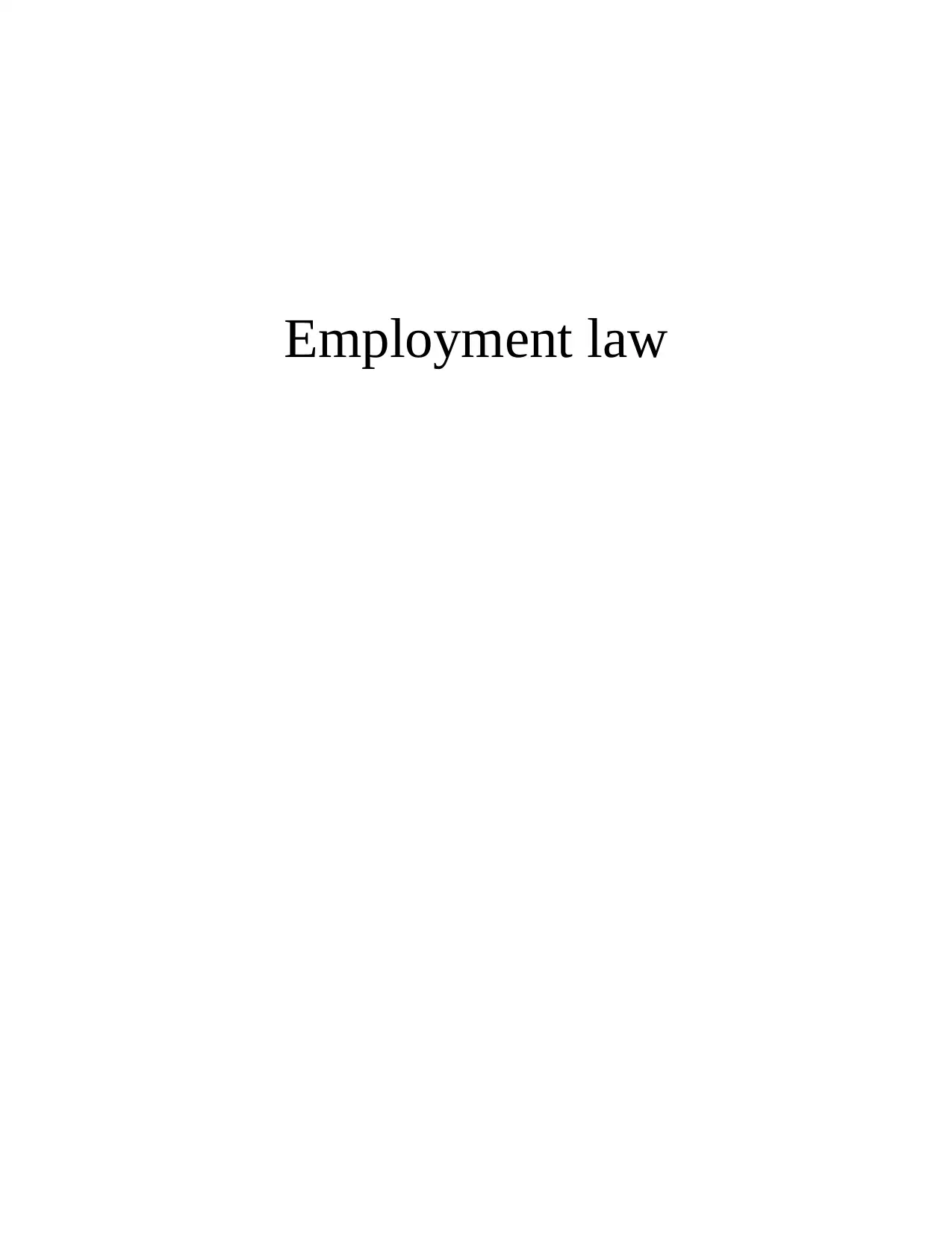
Employment law
Paraphrase This Document
Need a fresh take? Get an instant paraphrase of this document with our AI Paraphraser
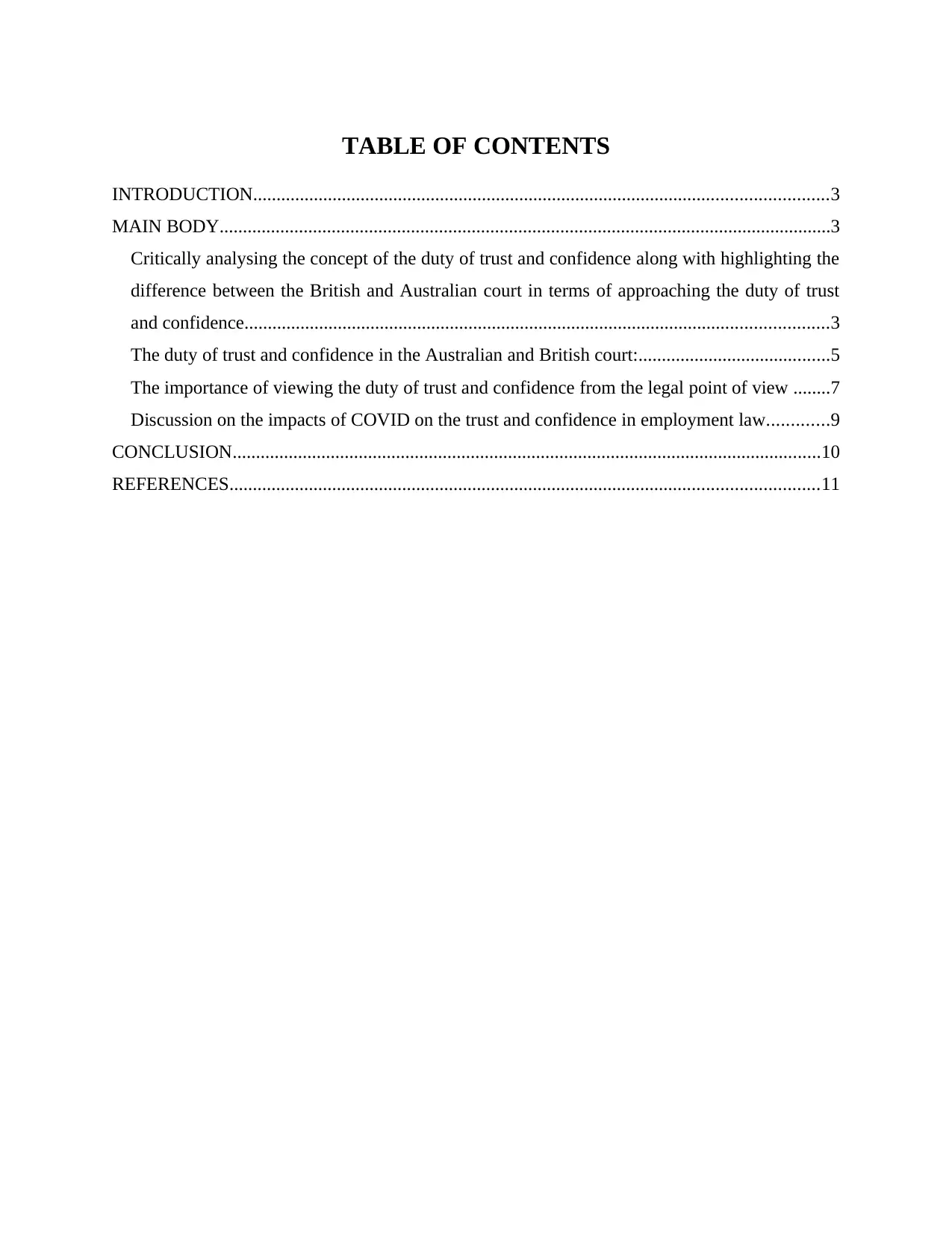
TABLE OF CONTENTS
INTRODUCTION...........................................................................................................................3
MAIN BODY...................................................................................................................................3
Critically analysing the concept of the duty of trust and confidence along with highlighting the
difference between the British and Australian court in terms of approaching the duty of trust
and confidence.............................................................................................................................3
The duty of trust and confidence in the Australian and British court:.........................................5
The importance of viewing the duty of trust and confidence from the legal point of view ........7
Discussion on the impacts of COVID on the trust and confidence in employment law.............9
CONCLUSION..............................................................................................................................10
REFERENCES..............................................................................................................................11
INTRODUCTION...........................................................................................................................3
MAIN BODY...................................................................................................................................3
Critically analysing the concept of the duty of trust and confidence along with highlighting the
difference between the British and Australian court in terms of approaching the duty of trust
and confidence.............................................................................................................................3
The duty of trust and confidence in the Australian and British court:.........................................5
The importance of viewing the duty of trust and confidence from the legal point of view ........7
Discussion on the impacts of COVID on the trust and confidence in employment law.............9
CONCLUSION..............................................................................................................................10
REFERENCES..............................................................................................................................11
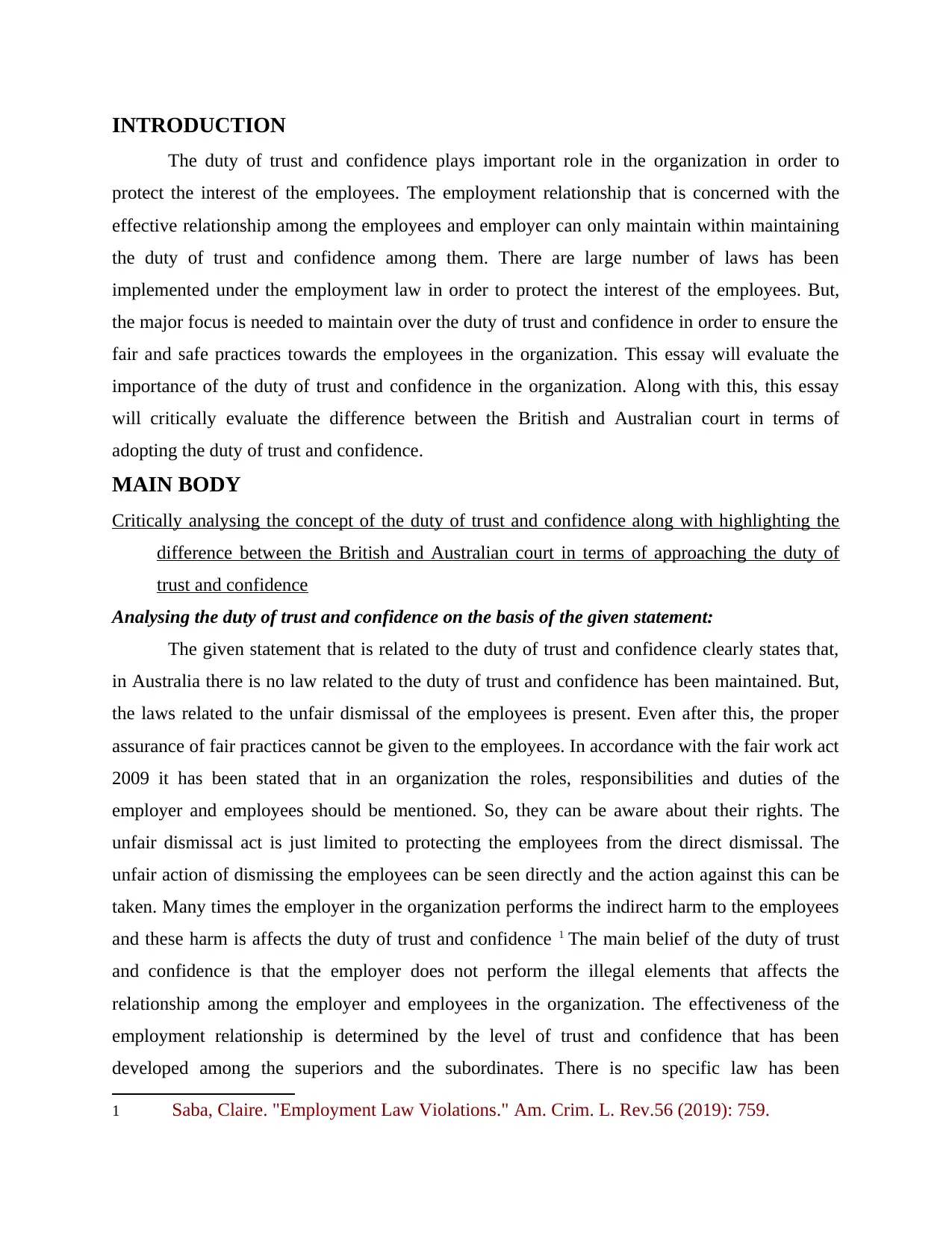
INTRODUCTION
The duty of trust and confidence plays important role in the organization in order to
protect the interest of the employees. The employment relationship that is concerned with the
effective relationship among the employees and employer can only maintain within maintaining
the duty of trust and confidence among them. There are large number of laws has been
implemented under the employment law in order to protect the interest of the employees. But,
the major focus is needed to maintain over the duty of trust and confidence in order to ensure the
fair and safe practices towards the employees in the organization. This essay will evaluate the
importance of the duty of trust and confidence in the organization. Along with this, this essay
will critically evaluate the difference between the British and Australian court in terms of
adopting the duty of trust and confidence.
MAIN BODY
Critically analysing the concept of the duty of trust and confidence along with highlighting the
difference between the British and Australian court in terms of approaching the duty of
trust and confidence
Analysing the duty of trust and confidence on the basis of the given statement:
The given statement that is related to the duty of trust and confidence clearly states that,
in Australia there is no law related to the duty of trust and confidence has been maintained. But,
the laws related to the unfair dismissal of the employees is present. Even after this, the proper
assurance of fair practices cannot be given to the employees. In accordance with the fair work act
2009 it has been stated that in an organization the roles, responsibilities and duties of the
employer and employees should be mentioned. So, they can be aware about their rights. The
unfair dismissal act is just limited to protecting the employees from the direct dismissal. The
unfair action of dismissing the employees can be seen directly and the action against this can be
taken. Many times the employer in the organization performs the indirect harm to the employees
and these harm is affects the duty of trust and confidence 1 The main belief of the duty of trust
and confidence is that the employer does not perform the illegal elements that affects the
relationship among the employer and employees in the organization. The effectiveness of the
employment relationship is determined by the level of trust and confidence that has been
developed among the superiors and the subordinates. There is no specific law has been
1 Saba, Claire. "Employment Law Violations." Am. Crim. L. Rev.56 (2019): 759.
The duty of trust and confidence plays important role in the organization in order to
protect the interest of the employees. The employment relationship that is concerned with the
effective relationship among the employees and employer can only maintain within maintaining
the duty of trust and confidence among them. There are large number of laws has been
implemented under the employment law in order to protect the interest of the employees. But,
the major focus is needed to maintain over the duty of trust and confidence in order to ensure the
fair and safe practices towards the employees in the organization. This essay will evaluate the
importance of the duty of trust and confidence in the organization. Along with this, this essay
will critically evaluate the difference between the British and Australian court in terms of
adopting the duty of trust and confidence.
MAIN BODY
Critically analysing the concept of the duty of trust and confidence along with highlighting the
difference between the British and Australian court in terms of approaching the duty of
trust and confidence
Analysing the duty of trust and confidence on the basis of the given statement:
The given statement that is related to the duty of trust and confidence clearly states that,
in Australia there is no law related to the duty of trust and confidence has been maintained. But,
the laws related to the unfair dismissal of the employees is present. Even after this, the proper
assurance of fair practices cannot be given to the employees. In accordance with the fair work act
2009 it has been stated that in an organization the roles, responsibilities and duties of the
employer and employees should be mentioned. So, they can be aware about their rights. The
unfair dismissal act is just limited to protecting the employees from the direct dismissal. The
unfair action of dismissing the employees can be seen directly and the action against this can be
taken. Many times the employer in the organization performs the indirect harm to the employees
and these harm is affects the duty of trust and confidence 1 The main belief of the duty of trust
and confidence is that the employer does not perform the illegal elements that affects the
relationship among the employer and employees in the organization. The effectiveness of the
employment relationship is determined by the level of trust and confidence that has been
developed among the superiors and the subordinates. There is no specific law has been
1 Saba, Claire. "Employment Law Violations." Am. Crim. L. Rev.56 (2019): 759.
⊘ This is a preview!⊘
Do you want full access?
Subscribe today to unlock all pages.

Trusted by 1+ million students worldwide
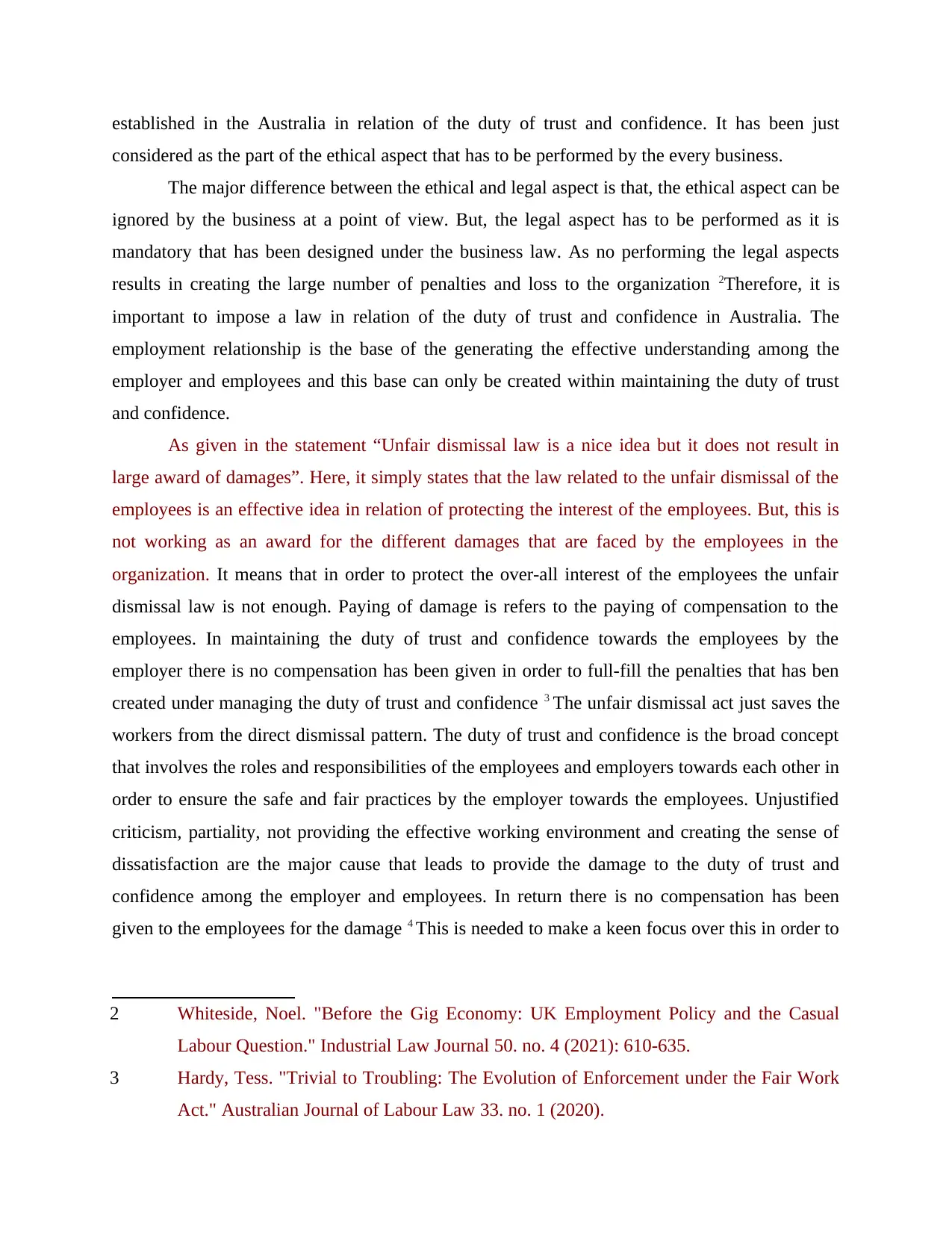
established in the Australia in relation of the duty of trust and confidence. It has been just
considered as the part of the ethical aspect that has to be performed by the every business.
The major difference between the ethical and legal aspect is that, the ethical aspect can be
ignored by the business at a point of view. But, the legal aspect has to be performed as it is
mandatory that has been designed under the business law. As no performing the legal aspects
results in creating the large number of penalties and loss to the organization 2Therefore, it is
important to impose a law in relation of the duty of trust and confidence in Australia. The
employment relationship is the base of the generating the effective understanding among the
employer and employees and this base can only be created within maintaining the duty of trust
and confidence.
As given in the statement “Unfair dismissal law is a nice idea but it does not result in
large award of damages”. Here, it simply states that the law related to the unfair dismissal of the
employees is an effective idea in relation of protecting the interest of the employees. But, this is
not working as an award for the different damages that are faced by the employees in the
organization. It means that in order to protect the over-all interest of the employees the unfair
dismissal law is not enough. Paying of damage is refers to the paying of compensation to the
employees. In maintaining the duty of trust and confidence towards the employees by the
employer there is no compensation has been given in order to full-fill the penalties that has ben
created under managing the duty of trust and confidence 3 The unfair dismissal act just saves the
workers from the direct dismissal pattern. The duty of trust and confidence is the broad concept
that involves the roles and responsibilities of the employees and employers towards each other in
order to ensure the safe and fair practices by the employer towards the employees. Unjustified
criticism, partiality, not providing the effective working environment and creating the sense of
dissatisfaction are the major cause that leads to provide the damage to the duty of trust and
confidence among the employer and employees. In return there is no compensation has been
given to the employees for the damage 4 This is needed to make a keen focus over this in order to
2 Whiteside, Noel. "Before the Gig Economy: UK Employment Policy and the Casual
Labour Question." Industrial Law Journal 50. no. 4 (2021): 610-635.
3 Hardy, Tess. "Trivial to Troubling: The Evolution of Enforcement under the Fair Work
Act." Australian Journal of Labour Law 33. no. 1 (2020).
considered as the part of the ethical aspect that has to be performed by the every business.
The major difference between the ethical and legal aspect is that, the ethical aspect can be
ignored by the business at a point of view. But, the legal aspect has to be performed as it is
mandatory that has been designed under the business law. As no performing the legal aspects
results in creating the large number of penalties and loss to the organization 2Therefore, it is
important to impose a law in relation of the duty of trust and confidence in Australia. The
employment relationship is the base of the generating the effective understanding among the
employer and employees and this base can only be created within maintaining the duty of trust
and confidence.
As given in the statement “Unfair dismissal law is a nice idea but it does not result in
large award of damages”. Here, it simply states that the law related to the unfair dismissal of the
employees is an effective idea in relation of protecting the interest of the employees. But, this is
not working as an award for the different damages that are faced by the employees in the
organization. It means that in order to protect the over-all interest of the employees the unfair
dismissal law is not enough. Paying of damage is refers to the paying of compensation to the
employees. In maintaining the duty of trust and confidence towards the employees by the
employer there is no compensation has been given in order to full-fill the penalties that has ben
created under managing the duty of trust and confidence 3 The unfair dismissal act just saves the
workers from the direct dismissal pattern. The duty of trust and confidence is the broad concept
that involves the roles and responsibilities of the employees and employers towards each other in
order to ensure the safe and fair practices by the employer towards the employees. Unjustified
criticism, partiality, not providing the effective working environment and creating the sense of
dissatisfaction are the major cause that leads to provide the damage to the duty of trust and
confidence among the employer and employees. In return there is no compensation has been
given to the employees for the damage 4 This is needed to make a keen focus over this in order to
2 Whiteside, Noel. "Before the Gig Economy: UK Employment Policy and the Casual
Labour Question." Industrial Law Journal 50. no. 4 (2021): 610-635.
3 Hardy, Tess. "Trivial to Troubling: The Evolution of Enforcement under the Fair Work
Act." Australian Journal of Labour Law 33. no. 1 (2020).
Paraphrase This Document
Need a fresh take? Get an instant paraphrase of this document with our AI Paraphraser
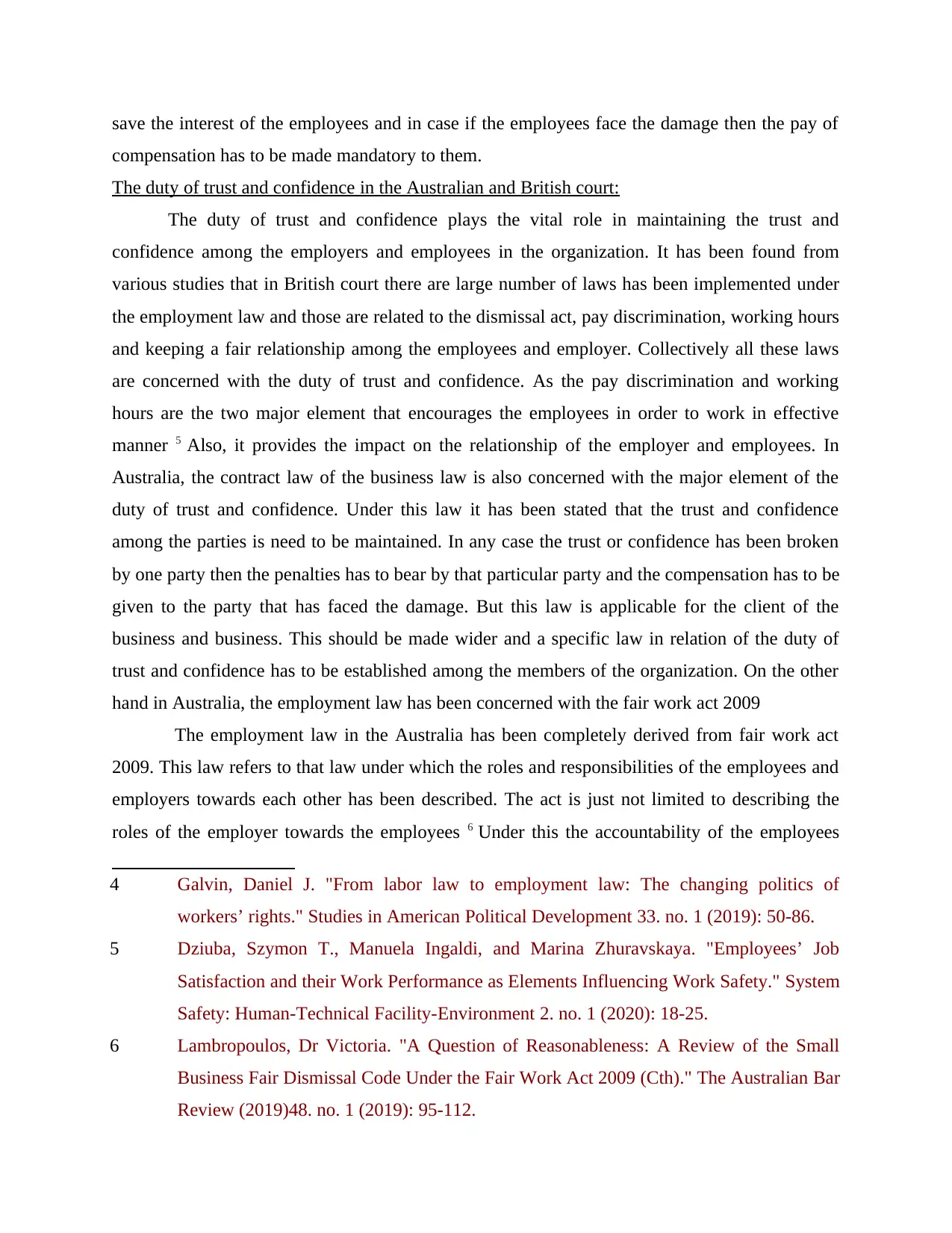
save the interest of the employees and in case if the employees face the damage then the pay of
compensation has to be made mandatory to them.
The duty of trust and confidence in the Australian and British court:
The duty of trust and confidence plays the vital role in maintaining the trust and
confidence among the employers and employees in the organization. It has been found from
various studies that in British court there are large number of laws has been implemented under
the employment law and those are related to the dismissal act, pay discrimination, working hours
and keeping a fair relationship among the employees and employer. Collectively all these laws
are concerned with the duty of trust and confidence. As the pay discrimination and working
hours are the two major element that encourages the employees in order to work in effective
manner 5 Also, it provides the impact on the relationship of the employer and employees. In
Australia, the contract law of the business law is also concerned with the major element of the
duty of trust and confidence. Under this law it has been stated that the trust and confidence
among the parties is need to be maintained. In any case the trust or confidence has been broken
by one party then the penalties has to bear by that particular party and the compensation has to be
given to the party that has faced the damage. But this law is applicable for the client of the
business and business. This should be made wider and a specific law in relation of the duty of
trust and confidence has to be established among the members of the organization. On the other
hand in Australia, the employment law has been concerned with the fair work act 2009
The employment law in the Australia has been completely derived from fair work act
2009. This law refers to that law under which the roles and responsibilities of the employees and
employers towards each other has been described. The act is just not limited to describing the
roles of the employer towards the employees 6 Under this the accountability of the employees
4 Galvin, Daniel J. "From labor law to employment law: The changing politics of
workers’ rights." Studies in American Political Development 33. no. 1 (2019): 50-86.
5 Dziuba, Szymon T., Manuela Ingaldi, and Marina Zhuravskaya. "Employees’ Job
Satisfaction and their Work Performance as Elements Influencing Work Safety." System
Safety: Human-Technical Facility-Environment 2. no. 1 (2020): 18-25.
6 Lambropoulos, Dr Victoria. "A Question of Reasonableness: A Review of the Small
Business Fair Dismissal Code Under the Fair Work Act 2009 (Cth)." The Australian Bar
Review (2019)48. no. 1 (2019): 95-112.
compensation has to be made mandatory to them.
The duty of trust and confidence in the Australian and British court:
The duty of trust and confidence plays the vital role in maintaining the trust and
confidence among the employers and employees in the organization. It has been found from
various studies that in British court there are large number of laws has been implemented under
the employment law and those are related to the dismissal act, pay discrimination, working hours
and keeping a fair relationship among the employees and employer. Collectively all these laws
are concerned with the duty of trust and confidence. As the pay discrimination and working
hours are the two major element that encourages the employees in order to work in effective
manner 5 Also, it provides the impact on the relationship of the employer and employees. In
Australia, the contract law of the business law is also concerned with the major element of the
duty of trust and confidence. Under this law it has been stated that the trust and confidence
among the parties is need to be maintained. In any case the trust or confidence has been broken
by one party then the penalties has to bear by that particular party and the compensation has to be
given to the party that has faced the damage. But this law is applicable for the client of the
business and business. This should be made wider and a specific law in relation of the duty of
trust and confidence has to be established among the members of the organization. On the other
hand in Australia, the employment law has been concerned with the fair work act 2009
The employment law in the Australia has been completely derived from fair work act
2009. This law refers to that law under which the roles and responsibilities of the employees and
employers towards each other has been described. The act is just not limited to describing the
roles of the employer towards the employees 6 Under this the accountability of the employees
4 Galvin, Daniel J. "From labor law to employment law: The changing politics of
workers’ rights." Studies in American Political Development 33. no. 1 (2019): 50-86.
5 Dziuba, Szymon T., Manuela Ingaldi, and Marina Zhuravskaya. "Employees’ Job
Satisfaction and their Work Performance as Elements Influencing Work Safety." System
Safety: Human-Technical Facility-Environment 2. no. 1 (2020): 18-25.
6 Lambropoulos, Dr Victoria. "A Question of Reasonableness: A Review of the Small
Business Fair Dismissal Code Under the Fair Work Act 2009 (Cth)." The Australian Bar
Review (2019)48. no. 1 (2019): 95-112.
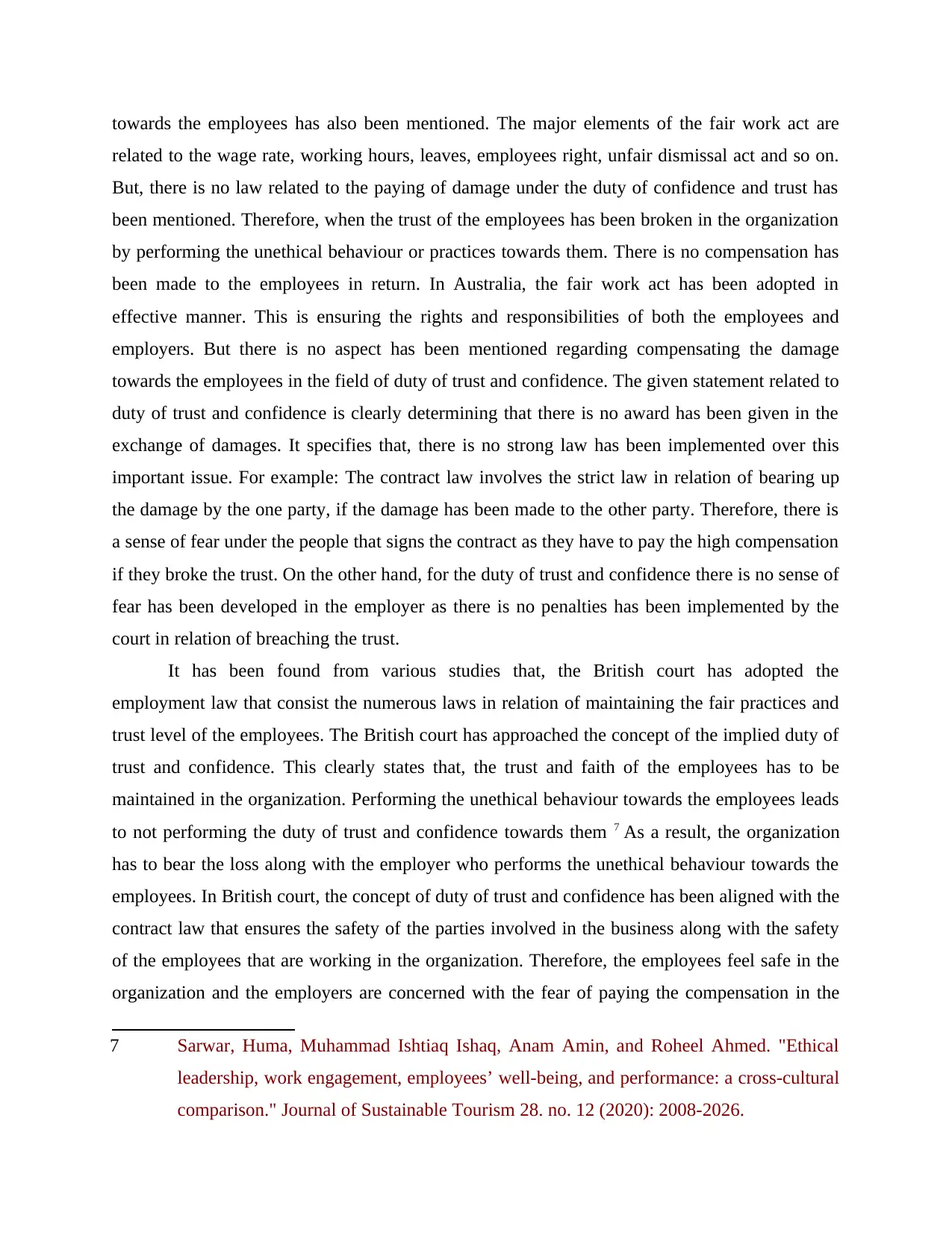
towards the employees has also been mentioned. The major elements of the fair work act are
related to the wage rate, working hours, leaves, employees right, unfair dismissal act and so on.
But, there is no law related to the paying of damage under the duty of confidence and trust has
been mentioned. Therefore, when the trust of the employees has been broken in the organization
by performing the unethical behaviour or practices towards them. There is no compensation has
been made to the employees in return. In Australia, the fair work act has been adopted in
effective manner. This is ensuring the rights and responsibilities of both the employees and
employers. But there is no aspect has been mentioned regarding compensating the damage
towards the employees in the field of duty of trust and confidence. The given statement related to
duty of trust and confidence is clearly determining that there is no award has been given in the
exchange of damages. It specifies that, there is no strong law has been implemented over this
important issue. For example: The contract law involves the strict law in relation of bearing up
the damage by the one party, if the damage has been made to the other party. Therefore, there is
a sense of fear under the people that signs the contract as they have to pay the high compensation
if they broke the trust. On the other hand, for the duty of trust and confidence there is no sense of
fear has been developed in the employer as there is no penalties has been implemented by the
court in relation of breaching the trust.
It has been found from various studies that, the British court has adopted the
employment law that consist the numerous laws in relation of maintaining the fair practices and
trust level of the employees. The British court has approached the concept of the implied duty of
trust and confidence. This clearly states that, the trust and faith of the employees has to be
maintained in the organization. Performing the unethical behaviour towards the employees leads
to not performing the duty of trust and confidence towards them 7 As a result, the organization
has to bear the loss along with the employer who performs the unethical behaviour towards the
employees. In British court, the concept of duty of trust and confidence has been aligned with the
contract law that ensures the safety of the parties involved in the business along with the safety
of the employees that are working in the organization. Therefore, the employees feel safe in the
organization and the employers are concerned with the fear of paying the compensation in the
7 Sarwar, Huma, Muhammad Ishtiaq Ishaq, Anam Amin, and Roheel Ahmed. "Ethical
leadership, work engagement, employees’ well-being, and performance: a cross-cultural
comparison." Journal of Sustainable Tourism 28. no. 12 (2020): 2008-2026.
related to the wage rate, working hours, leaves, employees right, unfair dismissal act and so on.
But, there is no law related to the paying of damage under the duty of confidence and trust has
been mentioned. Therefore, when the trust of the employees has been broken in the organization
by performing the unethical behaviour or practices towards them. There is no compensation has
been made to the employees in return. In Australia, the fair work act has been adopted in
effective manner. This is ensuring the rights and responsibilities of both the employees and
employers. But there is no aspect has been mentioned regarding compensating the damage
towards the employees in the field of duty of trust and confidence. The given statement related to
duty of trust and confidence is clearly determining that there is no award has been given in the
exchange of damages. It specifies that, there is no strong law has been implemented over this
important issue. For example: The contract law involves the strict law in relation of bearing up
the damage by the one party, if the damage has been made to the other party. Therefore, there is
a sense of fear under the people that signs the contract as they have to pay the high compensation
if they broke the trust. On the other hand, for the duty of trust and confidence there is no sense of
fear has been developed in the employer as there is no penalties has been implemented by the
court in relation of breaching the trust.
It has been found from various studies that, the British court has adopted the
employment law that consist the numerous laws in relation of maintaining the fair practices and
trust level of the employees. The British court has approached the concept of the implied duty of
trust and confidence. This clearly states that, the trust and faith of the employees has to be
maintained in the organization. Performing the unethical behaviour towards the employees leads
to not performing the duty of trust and confidence towards them 7 As a result, the organization
has to bear the loss along with the employer who performs the unethical behaviour towards the
employees. In British court, the concept of duty of trust and confidence has been aligned with the
contract law that ensures the safety of the parties involved in the business along with the safety
of the employees that are working in the organization. Therefore, the employees feel safe in the
organization and the employers are concerned with the fear of paying the compensation in the
7 Sarwar, Huma, Muhammad Ishtiaq Ishaq, Anam Amin, and Roheel Ahmed. "Ethical
leadership, work engagement, employees’ well-being, and performance: a cross-cultural
comparison." Journal of Sustainable Tourism 28. no. 12 (2020): 2008-2026.
⊘ This is a preview!⊘
Do you want full access?
Subscribe today to unlock all pages.

Trusted by 1+ million students worldwide
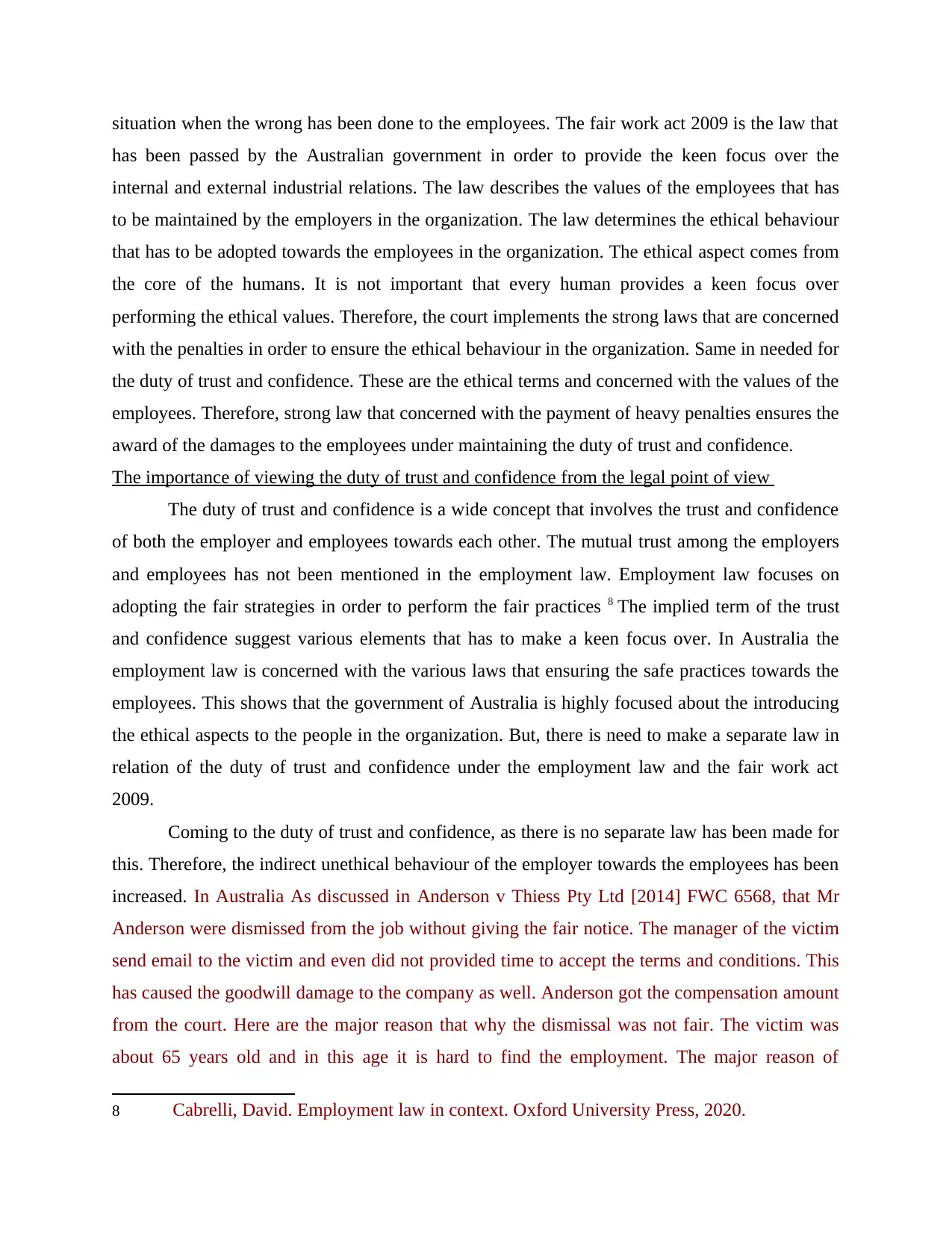
situation when the wrong has been done to the employees. The fair work act 2009 is the law that
has been passed by the Australian government in order to provide the keen focus over the
internal and external industrial relations. The law describes the values of the employees that has
to be maintained by the employers in the organization. The law determines the ethical behaviour
that has to be adopted towards the employees in the organization. The ethical aspect comes from
the core of the humans. It is not important that every human provides a keen focus over
performing the ethical values. Therefore, the court implements the strong laws that are concerned
with the penalties in order to ensure the ethical behaviour in the organization. Same in needed for
the duty of trust and confidence. These are the ethical terms and concerned with the values of the
employees. Therefore, strong law that concerned with the payment of heavy penalties ensures the
award of the damages to the employees under maintaining the duty of trust and confidence.
The importance of viewing the duty of trust and confidence from the legal point of view
The duty of trust and confidence is a wide concept that involves the trust and confidence
of both the employer and employees towards each other. The mutual trust among the employers
and employees has not been mentioned in the employment law. Employment law focuses on
adopting the fair strategies in order to perform the fair practices 8 The implied term of the trust
and confidence suggest various elements that has to make a keen focus over. In Australia the
employment law is concerned with the various laws that ensuring the safe practices towards the
employees. This shows that the government of Australia is highly focused about the introducing
the ethical aspects to the people in the organization. But, there is need to make a separate law in
relation of the duty of trust and confidence under the employment law and the fair work act
2009.
Coming to the duty of trust and confidence, as there is no separate law has been made for
this. Therefore, the indirect unethical behaviour of the employer towards the employees has been
increased. In Australia As discussed in Anderson v Thiess Pty Ltd [2014] FWC 6568, that Mr
Anderson were dismissed from the job without giving the fair notice. The manager of the victim
send email to the victim and even did not provided time to accept the terms and conditions. This
has caused the goodwill damage to the company as well. Anderson got the compensation amount
from the court. Here are the major reason that why the dismissal was not fair. The victim was
about 65 years old and in this age it is hard to find the employment. The major reason of
8 Cabrelli, David. Employment law in context. Oxford University Press, 2020.
has been passed by the Australian government in order to provide the keen focus over the
internal and external industrial relations. The law describes the values of the employees that has
to be maintained by the employers in the organization. The law determines the ethical behaviour
that has to be adopted towards the employees in the organization. The ethical aspect comes from
the core of the humans. It is not important that every human provides a keen focus over
performing the ethical values. Therefore, the court implements the strong laws that are concerned
with the penalties in order to ensure the ethical behaviour in the organization. Same in needed for
the duty of trust and confidence. These are the ethical terms and concerned with the values of the
employees. Therefore, strong law that concerned with the payment of heavy penalties ensures the
award of the damages to the employees under maintaining the duty of trust and confidence.
The importance of viewing the duty of trust and confidence from the legal point of view
The duty of trust and confidence is a wide concept that involves the trust and confidence
of both the employer and employees towards each other. The mutual trust among the employers
and employees has not been mentioned in the employment law. Employment law focuses on
adopting the fair strategies in order to perform the fair practices 8 The implied term of the trust
and confidence suggest various elements that has to make a keen focus over. In Australia the
employment law is concerned with the various laws that ensuring the safe practices towards the
employees. This shows that the government of Australia is highly focused about the introducing
the ethical aspects to the people in the organization. But, there is need to make a separate law in
relation of the duty of trust and confidence under the employment law and the fair work act
2009.
Coming to the duty of trust and confidence, as there is no separate law has been made for
this. Therefore, the indirect unethical behaviour of the employer towards the employees has been
increased. In Australia As discussed in Anderson v Thiess Pty Ltd [2014] FWC 6568, that Mr
Anderson were dismissed from the job without giving the fair notice. The manager of the victim
send email to the victim and even did not provided time to accept the terms and conditions. This
has caused the goodwill damage to the company as well. Anderson got the compensation amount
from the court. Here are the major reason that why the dismissal was not fair. The victim was
about 65 years old and in this age it is hard to find the employment. The major reason of
8 Cabrelli, David. Employment law in context. Oxford University Press, 2020.
Paraphrase This Document
Need a fresh take? Get an instant paraphrase of this document with our AI Paraphraser
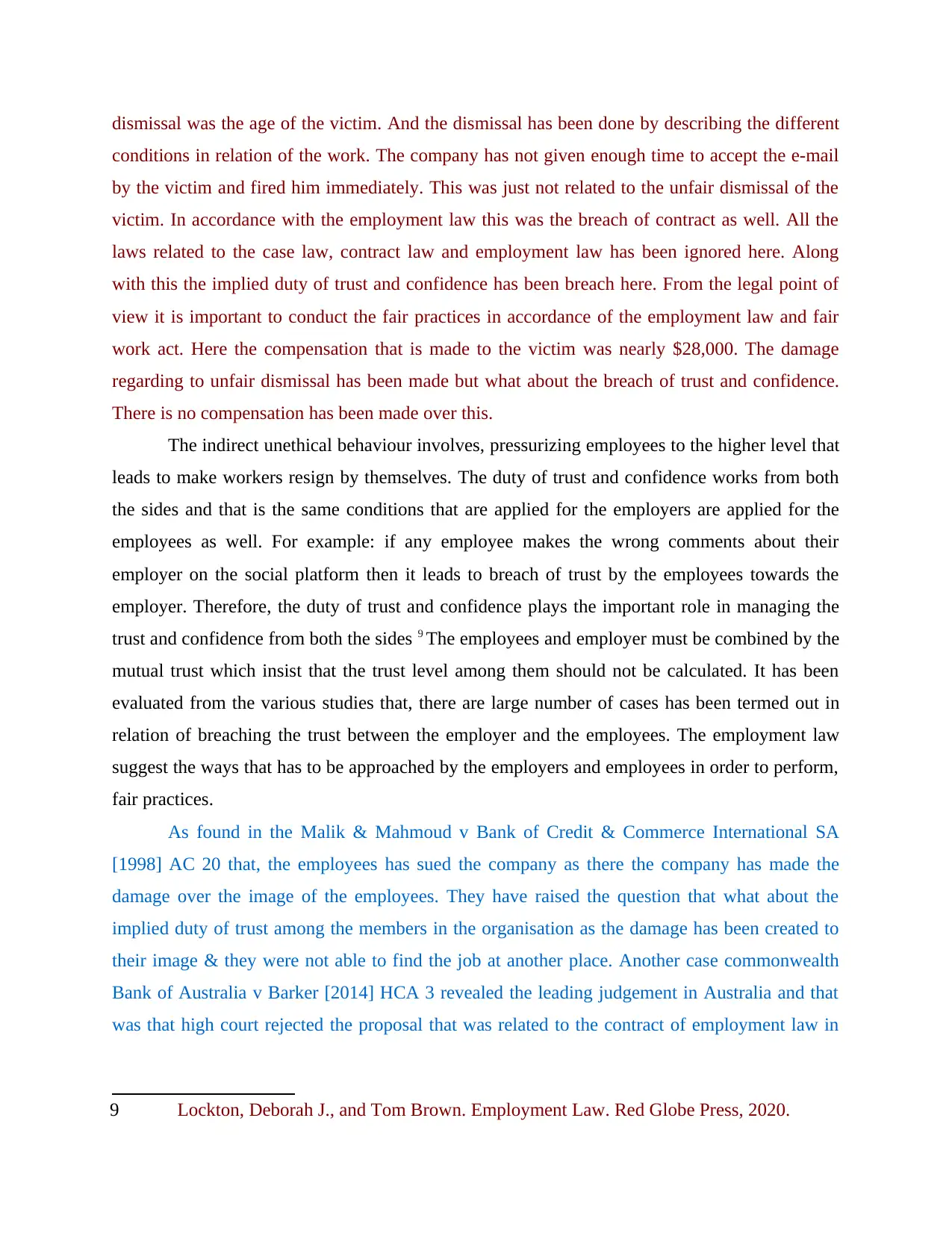
dismissal was the age of the victim. And the dismissal has been done by describing the different
conditions in relation of the work. The company has not given enough time to accept the e-mail
by the victim and fired him immediately. This was just not related to the unfair dismissal of the
victim. In accordance with the employment law this was the breach of contract as well. All the
laws related to the case law, contract law and employment law has been ignored here. Along
with this the implied duty of trust and confidence has been breach here. From the legal point of
view it is important to conduct the fair practices in accordance of the employment law and fair
work act. Here the compensation that is made to the victim was nearly $28,000. The damage
regarding to unfair dismissal has been made but what about the breach of trust and confidence.
There is no compensation has been made over this.
The indirect unethical behaviour involves, pressurizing employees to the higher level that
leads to make workers resign by themselves. The duty of trust and confidence works from both
the sides and that is the same conditions that are applied for the employers are applied for the
employees as well. For example: if any employee makes the wrong comments about their
employer on the social platform then it leads to breach of trust by the employees towards the
employer. Therefore, the duty of trust and confidence plays the important role in managing the
trust and confidence from both the sides 9 The employees and employer must be combined by the
mutual trust which insist that the trust level among them should not be calculated. It has been
evaluated from the various studies that, there are large number of cases has been termed out in
relation of breaching the trust between the employer and the employees. The employment law
suggest the ways that has to be approached by the employers and employees in order to perform,
fair practices.
As found in the Malik & Mahmoud v Bank of Credit & Commerce International SA
[1998] AC 20 that, the employees has sued the company as there the company has made the
damage over the image of the employees. They have raised the question that what about the
implied duty of trust among the members in the organisation as the damage has been created to
their image & they were not able to find the job at another place. Another case commonwealth
Bank of Australia v Barker [2014] HCA 3 revealed the leading judgement in Australia and that
was that high court rejected the proposal that was related to the contract of employment law in
9 Lockton, Deborah J., and Tom Brown. Employment Law. Red Globe Press, 2020.
conditions in relation of the work. The company has not given enough time to accept the e-mail
by the victim and fired him immediately. This was just not related to the unfair dismissal of the
victim. In accordance with the employment law this was the breach of contract as well. All the
laws related to the case law, contract law and employment law has been ignored here. Along
with this the implied duty of trust and confidence has been breach here. From the legal point of
view it is important to conduct the fair practices in accordance of the employment law and fair
work act. Here the compensation that is made to the victim was nearly $28,000. The damage
regarding to unfair dismissal has been made but what about the breach of trust and confidence.
There is no compensation has been made over this.
The indirect unethical behaviour involves, pressurizing employees to the higher level that
leads to make workers resign by themselves. The duty of trust and confidence works from both
the sides and that is the same conditions that are applied for the employers are applied for the
employees as well. For example: if any employee makes the wrong comments about their
employer on the social platform then it leads to breach of trust by the employees towards the
employer. Therefore, the duty of trust and confidence plays the important role in managing the
trust and confidence from both the sides 9 The employees and employer must be combined by the
mutual trust which insist that the trust level among them should not be calculated. It has been
evaluated from the various studies that, there are large number of cases has been termed out in
relation of breaching the trust between the employer and the employees. The employment law
suggest the ways that has to be approached by the employers and employees in order to perform,
fair practices.
As found in the Malik & Mahmoud v Bank of Credit & Commerce International SA
[1998] AC 20 that, the employees has sued the company as there the company has made the
damage over the image of the employees. They have raised the question that what about the
implied duty of trust among the members in the organisation as the damage has been created to
their image & they were not able to find the job at another place. Another case commonwealth
Bank of Australia v Barker [2014] HCA 3 revealed the leading judgement in Australia and that
was that high court rejected the proposal that was related to the contract of employment law in
9 Lockton, Deborah J., and Tom Brown. Employment Law. Red Globe Press, 2020.
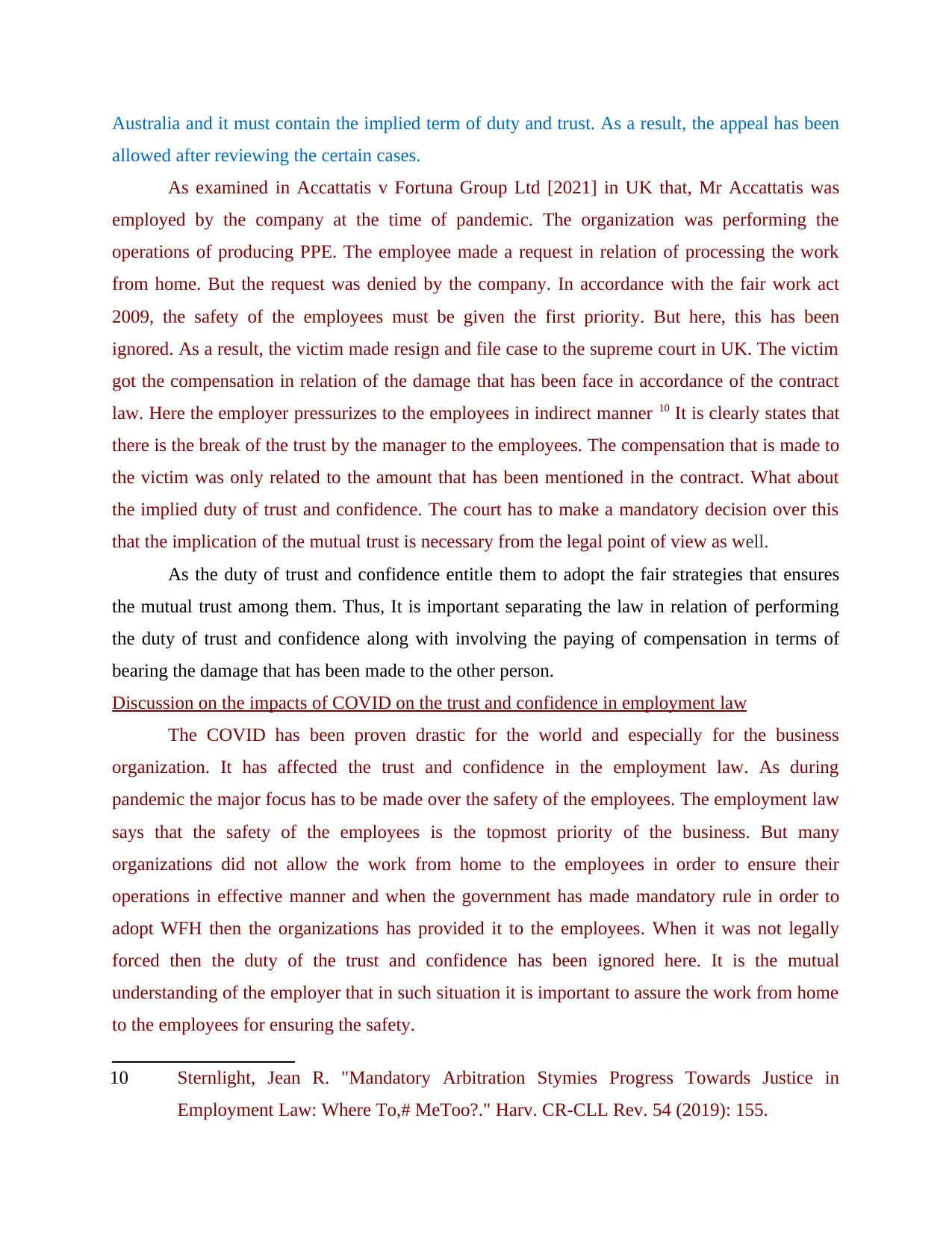
Australia and it must contain the implied term of duty and trust. As a result, the appeal has been
allowed after reviewing the certain cases.
As examined in Accattatis v Fortuna Group Ltd [2021] in UK that, Mr Accattatis was
employed by the company at the time of pandemic. The organization was performing the
operations of producing PPE. The employee made a request in relation of processing the work
from home. But the request was denied by the company. In accordance with the fair work act
2009, the safety of the employees must be given the first priority. But here, this has been
ignored. As a result, the victim made resign and file case to the supreme court in UK. The victim
got the compensation in relation of the damage that has been face in accordance of the contract
law. Here the employer pressurizes to the employees in indirect manner 10 It is clearly states that
there is the break of the trust by the manager to the employees. The compensation that is made to
the victim was only related to the amount that has been mentioned in the contract. What about
the implied duty of trust and confidence. The court has to make a mandatory decision over this
that the implication of the mutual trust is necessary from the legal point of view as well.
As the duty of trust and confidence entitle them to adopt the fair strategies that ensures
the mutual trust among them. Thus, It is important separating the law in relation of performing
the duty of trust and confidence along with involving the paying of compensation in terms of
bearing the damage that has been made to the other person.
Discussion on the impacts of COVID on the trust and confidence in employment law
The COVID has been proven drastic for the world and especially for the business
organization. It has affected the trust and confidence in the employment law. As during
pandemic the major focus has to be made over the safety of the employees. The employment law
says that the safety of the employees is the topmost priority of the business. But many
organizations did not allow the work from home to the employees in order to ensure their
operations in effective manner and when the government has made mandatory rule in order to
adopt WFH then the organizations has provided it to the employees. When it was not legally
forced then the duty of the trust and confidence has been ignored here. It is the mutual
understanding of the employer that in such situation it is important to assure the work from home
to the employees for ensuring the safety.
10 Sternlight, Jean R. "Mandatory Arbitration Stymies Progress Towards Justice in
Employment Law: Where To,# MeToo?." Harv. CR-CLL Rev. 54 (2019): 155.
allowed after reviewing the certain cases.
As examined in Accattatis v Fortuna Group Ltd [2021] in UK that, Mr Accattatis was
employed by the company at the time of pandemic. The organization was performing the
operations of producing PPE. The employee made a request in relation of processing the work
from home. But the request was denied by the company. In accordance with the fair work act
2009, the safety of the employees must be given the first priority. But here, this has been
ignored. As a result, the victim made resign and file case to the supreme court in UK. The victim
got the compensation in relation of the damage that has been face in accordance of the contract
law. Here the employer pressurizes to the employees in indirect manner 10 It is clearly states that
there is the break of the trust by the manager to the employees. The compensation that is made to
the victim was only related to the amount that has been mentioned in the contract. What about
the implied duty of trust and confidence. The court has to make a mandatory decision over this
that the implication of the mutual trust is necessary from the legal point of view as well.
As the duty of trust and confidence entitle them to adopt the fair strategies that ensures
the mutual trust among them. Thus, It is important separating the law in relation of performing
the duty of trust and confidence along with involving the paying of compensation in terms of
bearing the damage that has been made to the other person.
Discussion on the impacts of COVID on the trust and confidence in employment law
The COVID has been proven drastic for the world and especially for the business
organization. It has affected the trust and confidence in the employment law. As during
pandemic the major focus has to be made over the safety of the employees. The employment law
says that the safety of the employees is the topmost priority of the business. But many
organizations did not allow the work from home to the employees in order to ensure their
operations in effective manner and when the government has made mandatory rule in order to
adopt WFH then the organizations has provided it to the employees. When it was not legally
forced then the duty of the trust and confidence has been ignored here. It is the mutual
understanding of the employer that in such situation it is important to assure the work from home
to the employees for ensuring the safety.
10 Sternlight, Jean R. "Mandatory Arbitration Stymies Progress Towards Justice in
Employment Law: Where To,# MeToo?." Harv. CR-CLL Rev. 54 (2019): 155.
⊘ This is a preview!⊘
Do you want full access?
Subscribe today to unlock all pages.

Trusted by 1+ million students worldwide
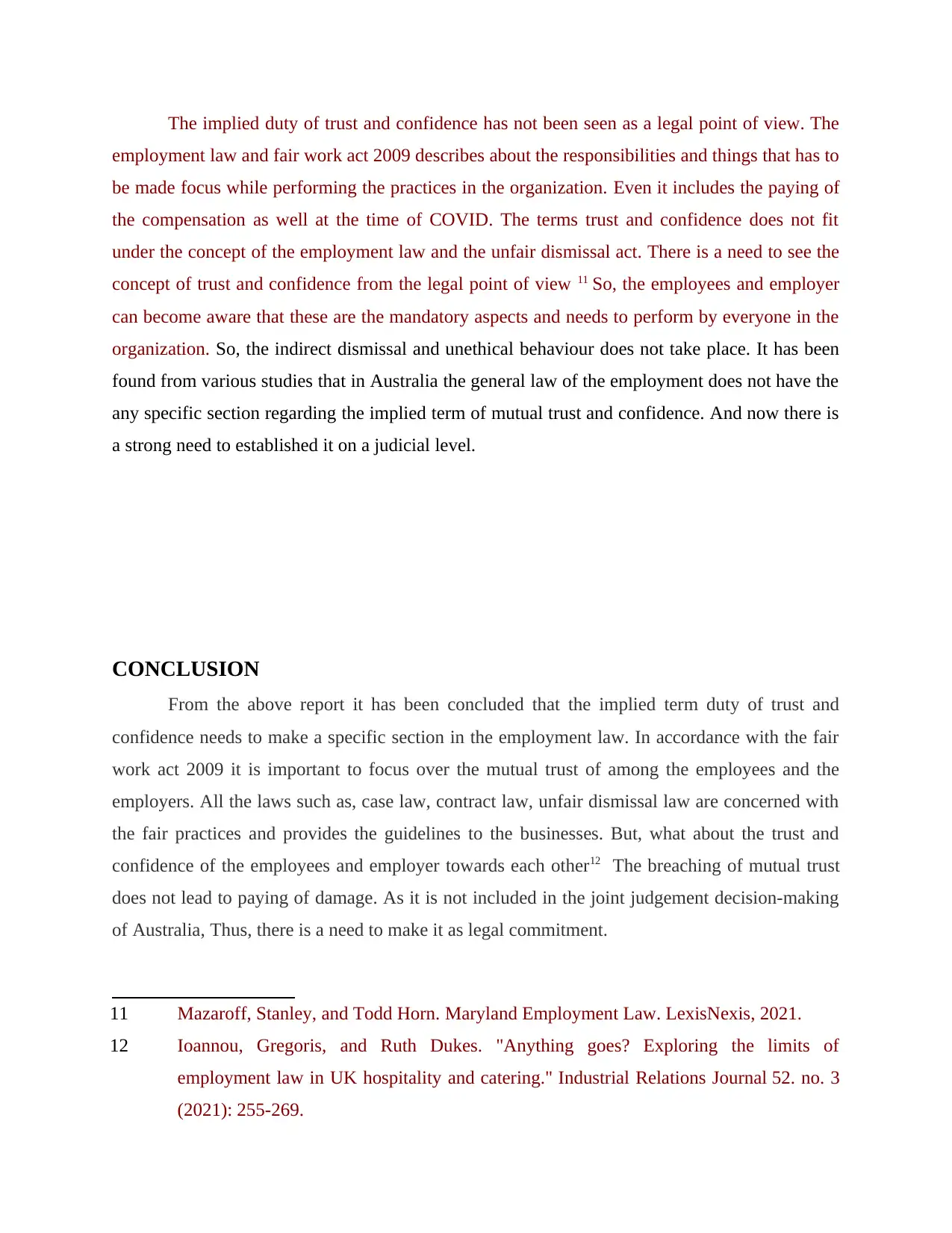
The implied duty of trust and confidence has not been seen as a legal point of view. The
employment law and fair work act 2009 describes about the responsibilities and things that has to
be made focus while performing the practices in the organization. Even it includes the paying of
the compensation as well at the time of COVID. The terms trust and confidence does not fit
under the concept of the employment law and the unfair dismissal act. There is a need to see the
concept of trust and confidence from the legal point of view 11 So, the employees and employer
can become aware that these are the mandatory aspects and needs to perform by everyone in the
organization. So, the indirect dismissal and unethical behaviour does not take place. It has been
found from various studies that in Australia the general law of the employment does not have the
any specific section regarding the implied term of mutual trust and confidence. And now there is
a strong need to established it on a judicial level.
CONCLUSION
From the above report it has been concluded that the implied term duty of trust and
confidence needs to make a specific section in the employment law. In accordance with the fair
work act 2009 it is important to focus over the mutual trust of among the employees and the
employers. All the laws such as, case law, contract law, unfair dismissal law are concerned with
the fair practices and provides the guidelines to the businesses. But, what about the trust and
confidence of the employees and employer towards each other12 The breaching of mutual trust
does not lead to paying of damage. As it is not included in the joint judgement decision-making
of Australia, Thus, there is a need to make it as legal commitment.
11 Mazaroff, Stanley, and Todd Horn. Maryland Employment Law. LexisNexis, 2021.
12 Ioannou, Gregoris, and Ruth Dukes. "Anything goes? Exploring the limits of
employment law in UK hospitality and catering." Industrial Relations Journal 52. no. 3
(2021): 255-269.
employment law and fair work act 2009 describes about the responsibilities and things that has to
be made focus while performing the practices in the organization. Even it includes the paying of
the compensation as well at the time of COVID. The terms trust and confidence does not fit
under the concept of the employment law and the unfair dismissal act. There is a need to see the
concept of trust and confidence from the legal point of view 11 So, the employees and employer
can become aware that these are the mandatory aspects and needs to perform by everyone in the
organization. So, the indirect dismissal and unethical behaviour does not take place. It has been
found from various studies that in Australia the general law of the employment does not have the
any specific section regarding the implied term of mutual trust and confidence. And now there is
a strong need to established it on a judicial level.
CONCLUSION
From the above report it has been concluded that the implied term duty of trust and
confidence needs to make a specific section in the employment law. In accordance with the fair
work act 2009 it is important to focus over the mutual trust of among the employees and the
employers. All the laws such as, case law, contract law, unfair dismissal law are concerned with
the fair practices and provides the guidelines to the businesses. But, what about the trust and
confidence of the employees and employer towards each other12 The breaching of mutual trust
does not lead to paying of damage. As it is not included in the joint judgement decision-making
of Australia, Thus, there is a need to make it as legal commitment.
11 Mazaroff, Stanley, and Todd Horn. Maryland Employment Law. LexisNexis, 2021.
12 Ioannou, Gregoris, and Ruth Dukes. "Anything goes? Exploring the limits of
employment law in UK hospitality and catering." Industrial Relations Journal 52. no. 3
(2021): 255-269.
Paraphrase This Document
Need a fresh take? Get an instant paraphrase of this document with our AI Paraphraser

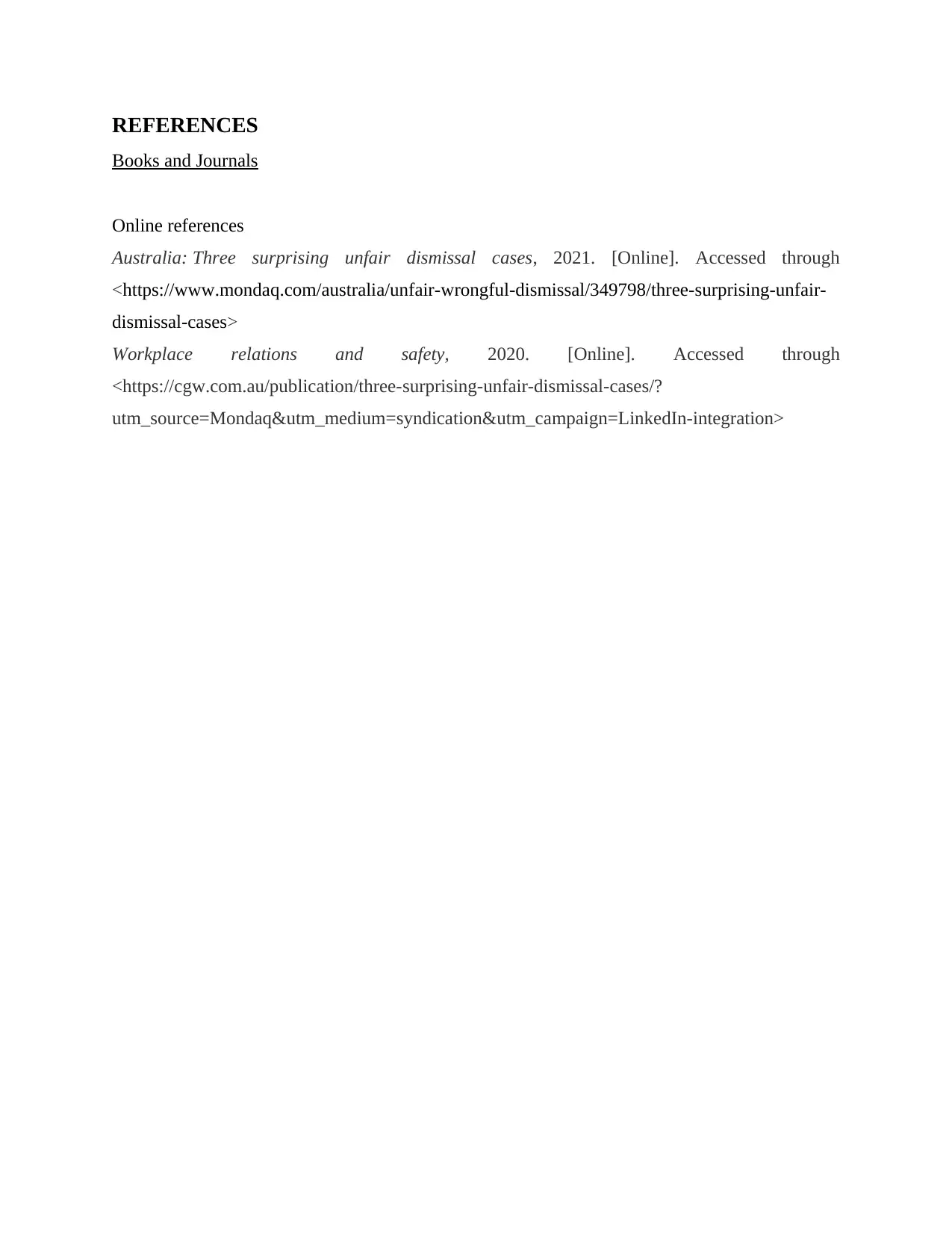
REFERENCES
Books and Journals
Online references
Australia: Three surprising unfair dismissal cases, 2021. [Online]. Accessed through
<https://www.mondaq.com/australia/unfair-wrongful-dismissal/349798/three-surprising-unfair-
dismissal-cases>
Workplace relations and safety, 2020. [Online]. Accessed through
<https://cgw.com.au/publication/three-surprising-unfair-dismissal-cases/?
utm_source=Mondaq&utm_medium=syndication&utm_campaign=LinkedIn-integration>
Books and Journals
Online references
Australia: Three surprising unfair dismissal cases, 2021. [Online]. Accessed through
<https://www.mondaq.com/australia/unfair-wrongful-dismissal/349798/three-surprising-unfair-
dismissal-cases>
Workplace relations and safety, 2020. [Online]. Accessed through
<https://cgw.com.au/publication/three-surprising-unfair-dismissal-cases/?
utm_source=Mondaq&utm_medium=syndication&utm_campaign=LinkedIn-integration>
⊘ This is a preview!⊘
Do you want full access?
Subscribe today to unlock all pages.

Trusted by 1+ million students worldwide
1 out of 12
Related Documents
Your All-in-One AI-Powered Toolkit for Academic Success.
+13062052269
info@desklib.com
Available 24*7 on WhatsApp / Email
![[object Object]](/_next/static/media/star-bottom.7253800d.svg)
Unlock your academic potential
Copyright © 2020–2025 A2Z Services. All Rights Reserved. Developed and managed by ZUCOL.




